名词单复数,数词,量词,someany
some和any的区别和用法

some 和any 的区别和用法要表示"一些"的意思,可用some, any 。
some 是肯定词(ASSERTIVE WORD 〕,常用于肯定句;any 是非肯定词(NONASSERTIVE WORD 〕,常用于否定句或疑问句。
例如:There are some letters for me.There aren''t any letters for me.Are there any letters for me?I seldom get any sleep these days.any 也常用于条件分句以及带有否定含义的句子中:If you have any trouble, please let me know. 如果你有任何麻烦,请让我知道。
I forgot to ask for any change. 我忘了要一些零钱。
当说话人期待肯定回答时,some 也可用于疑问句, 比如当说话人期待来信时,他可以问道:Are there some letters for me?当购物时向售货员提问或者主人向客人表示款待时,也可在疑问句中用some:some 和any 既可以修饰可数名词又可以修饰不可数名词,some 常用在肯定句中,而any 则常用在否定和疑问句中。
因此 some 和any 的用法主要是考虑用在肯定句、疑问句还是否定句中,与名词的可数与否无关。
some 意为“一些”,可作形容词和代词。
它常修饰可数名词复数。
如:some books 一些书,some boys 一些男孩,也可修饰不可数名词,如:some water 一些水,some tea 一些茶叶,some 常用在肯定句中。
any 意为“任何一些”,它也可修饰可数名词复数或不可数名词,常用于疑问句和否定句。
如:--I have some tea here. 我这儿有些茶叶。
--I can’t see any tea. 我没看见茶叶。
数量词作宾语的例子
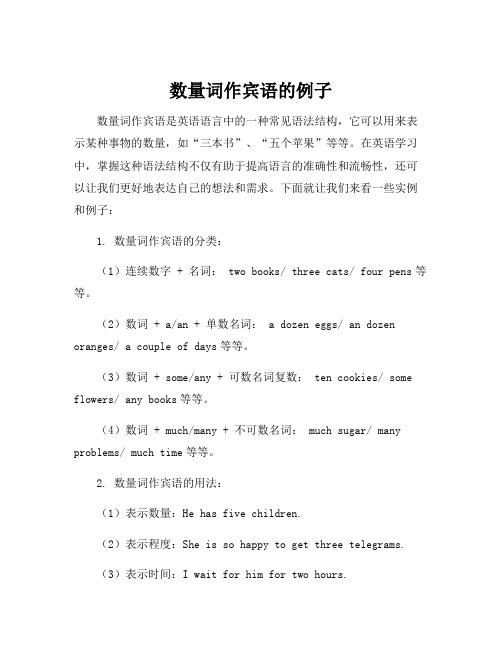
数量词作宾语的例子数量词作宾语是英语语言中的一种常见语法结构,它可以用来表示某种事物的数量,如“三本书”、“五个苹果”等等。
在英语学习中,掌握这种语法结构不仅有助于提高语言的准确性和流畅性,还可以让我们更好地表达自己的想法和需求。
下面就让我们来看一些实例和例子:1. 数量词作宾语的分类:(1)连续数字 + 名词: two books/ three cats/ four pens等等。
(2)数词 + a/an + 单数名词: a dozen eggs/ an dozen oranges/ a couple of days等等。
(3)数词 + some/any + 可数名词复数: ten cookies/ some flowers/ any books等等。
(4)数词 + much/many + 不可数名词: much sugar/ many problems/ much time等等。
2. 数量词作宾语的用法:(1)表示数量:He has five children.(2)表示程度:She is so happy to get three telegrams.(3)表示时间:I wait for him for two hours.(4)表示距离:We can reach the airport in 20 minutes by car.(5)表示价格:The dress costs me 200 dollars.(6)表示重量:It is about two kilos in weight.3. 数量词作宾语的注意事项:(1)不可数名词不能用来加a/an,只能用much或little表示数量。
(2)若主语为第三人称单数,用one代替a/an,例如:One boy came to our house.(3)在被数词修饰的名词前不能再用其他表示数量的语词,例如:three apples而不是three red apples。
英语数量词
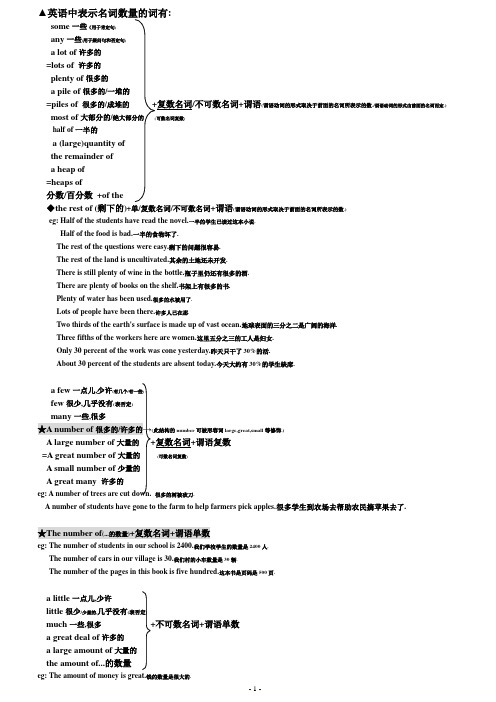
▲some一些(用于肯定句)any一些(用于疑问句和否定句)a lot of许多的=lots of 许多的plenty of很多的a pile of很多的/一堆的=piles of 很多的/成堆的不可数名词+谓语(谓语动词的形式取决于前面的名词所表示的数./谓语动词的形式由前面的名词而定.) most of大部分的/half of一半的a (large)quantity ofthe remainder ofa heap of=heaps of分数/百分数+of the◆the rest of (剩下的)+单/复数名词/不可数名词+谓语(谓语动词的形式取决于前面的名词所表示的数.)eg: Half of the students have read the novel.一半的学生已读过这本小说.Half of the food is bad.一半的食物坏了.The rest of the questions were easy.剩下的问题很容易.The rest of the land is uncultivated.其余的土地还未开发.There is still plenty of wine in the bottle.瓶子里仍还有很多的酒.There are plenty of books on the shelf.书架上有很多的书.Plenty of water has been used.很多的水被用了.Lots of people have been there.许多人已在那.Two thirds of the earth's surface is made up of vast ocean.地球表面的三分之二是广阔的海洋.Three fifths of the workers here are women.这里五分之三的工人是妇女.Only 30 percent of the work was cone yesterday.昨天只干了30%的活.About 30 percent of the students are absent today.今天大约有30%的学生缺席.此结构的number可被形容词large,great,small等修饰.)+复数名词+谓语复数(可数名词复数)很多的树被砍刀.A number of students have gone to the farm to help farmers pick apples.很多学生到农场去帮助农民摘苹果去了.★The number of(...的数量)+复数名词+谓语单数eg: The number of students in our school is 2400.我们学校学生的数量是2400人.The number of cars in our village is 30.我们村的小车数量是30辆.The number of the pages in this book is five hundred.这本书是页码是500页.a little一点儿,少许little很少/少量的,几乎没有(表否定)much一些,很多+不可数名词+谓语单数a great deal of许多的a large amount of大量的the amount of...的数量eg: The amount of money is great.钱的数量是很大的.the quantity of" ...的数量"+复数名词/不可数名词+谓语单数large/huge quantities of "大量的..."+复数名词/不可数名词+谓语复数large amounts of "大量的..."+不可数名词+谓语复数eg: The quantity of the books in the library is amazing.图书馆书的数量是令人惊讶的.Large quantities of water are needed for cooling purposes.冷却需要大量的水.Large amounts of money were spent on the bridge.大量的钱花在这座桥上.▲英语中修饰形容词/副词的词有:/副词▲注意:1,修饰形容词时,a little=a little bit=a bit有点儿/稍微.2,a little, a bit既可修饰形/副,也可修饰形/副比较级,但a little 还可修饰名词,后可直接跟名词,a bit 后要跟名词的话须加介词of. 如:I have a little money.=I have a bit of money.我有一点钱.。
some与any用法区别82192
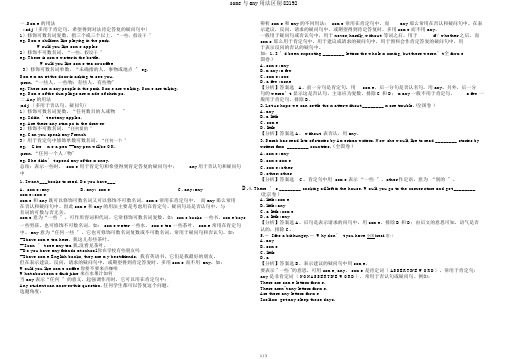
一 .Some 的用法: adj.〔多用于肯定句、希望得到对法肯定答复的疑问句中〕 1〕修饰可数名词复数,指三个或三个以上,“一些、假设干 〞 eg. Some children like playing in the park.Would you like some apples2〕修饰不可数名词,“一些、假设干 〞 eg. There is some water in the bottle.Would you like some tea or coffee3〕修饰可数名词单数,“未确指的人、事物或地点 〞 eg. Some man at the door is asking to see you. :pron. “一些人、一些物;有些人、有些物〞eg. There are many people in the park. Some are walking. Some are talking. eg. Some of the dumplings are made of shrimps. 二 .Any 的用法:adj. 〔多用于否认句、疑问句〕1〕修饰可数名词复数,“任何数目的人或物 〞 eg. I didn ’t eat any apples.eg. Are there any stamps in the drawer 2〕修饰不可数名词,“任何量的 〞 eg. Can you speak any French3〕用于肯定句中修饰单数可数名词,“任何一个 〞 eg. Give me a pen ---any pen will be OK.辨析 some 和 any 的不同用法: some 常用在肯定句中,而 any 那么常用在否认和疑问句中。
在表示建议,反问,请求的疑问句中,或期望得到肯定答复时,多用some 而不用 any 。
一般用于疑问句或否认句中,用于never, hardly, without 等词之后,用于 if / whether 之后。
some any的区别和用法讲解

一、some 和 any 的基本用法1. "Some" 和 "any" 都是英语中的量词,用于表示数量或程度。
2. "Some" 通常用于肯定句和疑问句中,表示肯定的数量或程度。
3. "Any" 通常用于否定句和疑问句中,表示任何数量或程度。
二、"Some" 和 "Any" 的具体用法4. "Some" 的具体用法:a. 用于肯定句中表示肯定的数量或程度,例如:“She has some books to read.”(她有一些书要读)b. 用于疑问句中请求肯定的答复,例如:“Would you like some tea?”(你想喝一些茶吗)c. 用于提议或请求时,例如:“Could I have some water, please?”(我可以喝点水吗)5. "Any" 的具体用法:a. 用于否定句中表示任何数量或程度,例如:“I don't have any money.”(我没有任何钱)b. 用于疑问句中请求否定的答复,例如:“Is there any food left?”(还有剩下的食物吗)c. 用于条件句或假设句中表示任何可能的情况,例如:“You can take any seat you like.”(你可以选择任何一个座位)三、"Some" 与 "Any" 的区别6. "Some" 用于肯定句和疑问句中,表示肯定的情况或提议请求;"Any" 用于否定句和疑问句中,表示否定的情况或假设情况。
7. "Some" 常用于可数名词和不可数名词;"Any" 一般用于可数名词的复数和不可数名词。
8. "Some" 带有一种积极的、自信的语气;"Any" 带有一种消极的、条件性的语气。
any后面跟单数还是复数都有哪些用法
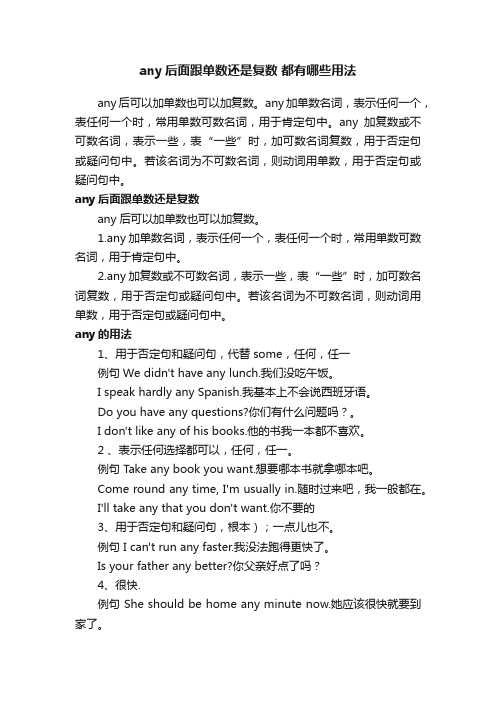
any后面跟单数还是复数都有哪些用法any后可以加单数也可以加复数。
any加单数名词,表示任何一个,表任何一个时,常用单数可数名词,用于肯定句中。
any加复数或不可数名词,表示一些,表“一些”时,加可数名词复数,用于否定句或疑问句中。
若该名词为不可数名词,则动词用单数,用于否定句或疑问句中。
any后面跟单数还是复数any后可以加单数也可以加复数。
1.any加单数名词,表示任何一个,表任何一个时,常用单数可数名词,用于肯定句中。
2.any加复数或不可数名词,表示一些,表“一些”时,加可数名词复数,用于否定句或疑问句中。
若该名词为不可数名词,则动词用单数,用于否定句或疑问句中。
any的用法1、用于否定句和疑问句,代替some,任何,任一例句We didn't have any lunch.我们没吃午饭。
I speak hardly any Spanish.我基本上不会说西班牙语。
Do you have any questions?你们有什么问题吗?。
I don't like any of his books.他的书我一本都不喜欢。
2 、表示任何选择都可以,任何,任一。
例句 Take any book you want.想要哪本书就拿哪本吧。
Come round any time, I'm usually in.随时过来吧,我一般都在。
I'll take any that you don't want.你不要的3、用于否定句和疑问句,根本);一点儿也不。
例句 I can't run any faster.我没法跑得更快了。
Is your father any better?你父亲好点了吗?4、很快.例句 She should be home any minute now.她应该很快就要到家了。
英语中 数量词及用法
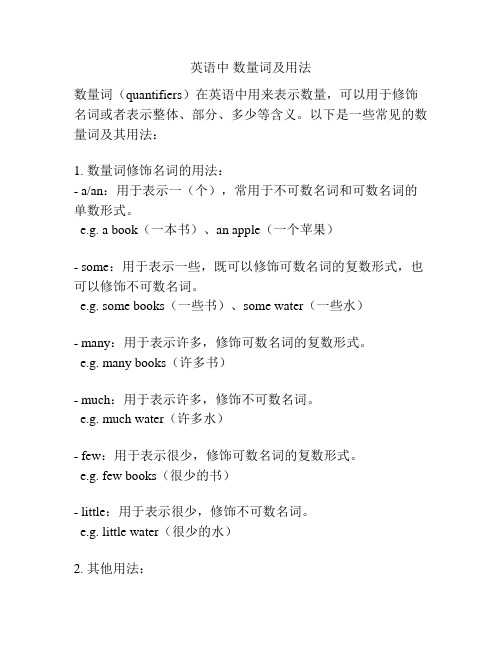
英语中数量词及用法数量词(quantifiers)在英语中用来表示数量,可以用于修饰名词或者表示整体、部分、多少等含义。
以下是一些常见的数量词及其用法:1. 数量词修饰名词的用法:- a/an:用于表示一(个),常用于不可数名词和可数名词的单数形式。
e.g. a book(一本书)、an apple(一个苹果)- some:用于表示一些,既可以修饰可数名词的复数形式,也可以修饰不可数名词。
e.g. some books(一些书)、some water(一些水)- many:用于表示许多,修饰可数名词的复数形式。
e.g. many books(许多书)- much:用于表示许多,修饰不可数名词。
e.g. much water(许多水)- few:用于表示很少,修饰可数名词的复数形式。
e.g. few books(很少的书)- little:用于表示很少,修饰不可数名词。
e.g. little water(很少的水)2. 其他用法:- all:表示全部,修饰可数名词或不可数名词。
e.g. all the books(所有的书)、all the water(所有的水)- any:表示任何,修饰可数名词或不可数名词。
e.g. any book(任何一本书)、any water(任何一些水)- each:表示每个,修饰可数名词的单数形式。
e.g. each student(每个学生)- every:表示每个,修饰可数名词的单数形式或不可数名词。
e.g. every student(每个学生)、every day(每天)- both:表示两者都,修饰可数名词的复数形式。
e.g. both books(两本书)- either:表示其中任何一个,修饰可数名词的单数形式。
e.g. either book(其中任何一本书)上述仅为一些常见的数量词及其用法,还有其他数量词如fewer、more、none等,用法和意义有所不同。
some和 any的区别

some和any 的区别
some和any 既可以修饰可数名词又可以修饰不可数名词,
some常用在肯定句中,而any则常用在否定和疑问句中.因此some和any 的用法主要是考虑用在肯定句、疑问句还是否定句中,与名词的可数与否无关.
some意为“一些”,可作形容词和代词.它常修饰可数名词复数.如:some books一些书,some boys一些男孩,也可修饰不可数名词,如:some water一些水,some tea一些茶叶,some常用在肯定句中.
any意为“任何一些”,它也可修饰可数名词复数或不可数名词,常用于疑问句和否定句.如:--I have some tea here. 我这儿有些茶叶. --I can’t see any tea. 我没看见茶叶. --Do you have any friends at school? 你在学校有些朋友吗? --I have some English books, they are my best friends. 我有英语书,它们是我最好的朋友.
但在表示建议,反问,请求的疑问句中,或期望得到肯定回答时,多用some而不用any.如:Would you like some coffee? 你要不要来点咖啡? What about some fruit juice? 来点水果汁如何?
当any表示“任何”的意义,起强调作用时,它可以用在肯定句中;Any student can answer this question.任何学生都可以回答这个问题.
选题角度:辨析some和any的不同用法:
some 常用在肯定句中,而any 则常用在否定和疑问句中.在表示建议,反问,请求的疑问句中,或期望得到肯定回答时,多用some而不用any.。
- 1、下载文档前请自行甄别文档内容的完整性,平台不提供额外的编辑、内容补充、找答案等附加服务。
- 2、"仅部分预览"的文档,不可在线预览部分如存在完整性等问题,可反馈申请退款(可完整预览的文档不适用该条件!)。
- 3、如文档侵犯您的权益,请联系客服反馈,我们会尽快为您处理(人工客服工作时间:9:00-18:30)。
名词的单数和复数A. Write out the plural forms.写出下列名词的复数形式。
B. Choose the correct nouns and fill in the blanks with their plurals.从列表中选择恰当的名词,然后用其正确的复数形式完成下列句子。
child foot mouse tooth fish man sheep woma n1) A den tist fixes ―teeth2) Cats like to catch ______________________ 3) Baby lambs become _________________________ 4) There are many differe nt kinds of 5)We put shoes on our1) box3)zoo5)baby7)city 9) dishboxes2) tomato 4) pen6) key8)wife10) thiefin the sea.6)In your culture, do and wome n have the samefreedoms?7)Some movies are very viole nt. They are not good for __________8)Are men and ________________________ very differe nt?C.Fill in the blanks with the correct forms of the nouns. Use ••- of …whe n n ecessary.用所给名词的正确形式填空,必要的时候用“…。
彳…”结构。
(1)I can see two __________________ (bus) on the road.(2)How many ____________________ (ma ngo) are there in the fridge?(3)Paul is drinking two _________________________ (t in, cola).(4)Please give me three ________________________________ (slice, bread).(5)The police caught two __________________ (thief) last ni ght.(6)There are many _____________________ (co un try) in Asia.(7)My father told us some _________________ (story) before we went to bed.(8)There are two ______________________________ (bowl, soup) on the table.(9)I want to have four _________________________________ (plate, fried rice).A.Write out the plural forms.写出下列名词的复数形式。
1) photo photos 2) watch3) key 4) leaf5) story 6) mouse7) foot 8) potato9)sheep 10) brushB.Fill in the blanks with the correct forms of the nouns.用所给名词的正确形式填空。
(1)There are many __________________ (packet) of chips.(2)How much __________________ (peanut butter) is there in the fridge?(3)Paul is eating two _______________________ (longan).(4)Please give me three _____________________________ (glass) of juice.(5)Two ____________ (thief) were caught by two brave ________________ (man).(6)There are many __________________ (city) in China.(7)My father told us a story about three __________________ (mouse).(8)She picked a few beautiful ___________________ (leaf) on the ground.(9)There are a lot of ______________ (sheep) eating grass.(1)常见的表示数量的限定词有:some, any, enough, many, much, a few, a little, few, little 等;(2)some 和any 表示一些,位于复数名词或不可数名词之前。
some 通常用于肯定句,any 主要用于否定句或疑问句中。
e.g. There 's some milk in the fridge.We haven 'tgot any milk in the fridge. 当表示主动帮忙和请求时,通常用some。
e.g. Would you like some coffee?Can you give me some tea?(3) a lot of/many/much/plenty of 表示大量的,多的; a few/a little 表示少量;few/little 表示否定概念,几乎没有;enough 表示足够。
(4)many, too many (太多),a few (—些),few (几乎没有)用来修饰可数名词复数;much, too much (太多),a little (一些),little (几乎没有)用来修饰不可数名词; a lot of, ple nty of, eno ugh, some, any既可以修饰可数,也可以修饰不可数名词。
e.g. There are too many carrots but there are only a few peas.There is too much salt but there is only a little sugar.There are a lot of biscuits and plenty of milk.There is eno ugh food but there are not eno ugh drinks.(5)常常会用到many, much, few, little 的比较级与最高级:much/ma ny more mostlittle less leastfew fewer feweste.g. I have many clothes.Sam has more clothes tha n me.Ken has the most clothes of us allA. Circle the correct words.(1)I have a little (water/books).(2)Ryan 'cat has too much (hair/fleas).(3)There are many (people/ora nge juice) in the kitche n.(4)An gel has too many (milk/dresses) in the closet.(5)There are a few (childre n/paper) in the room.(6)We have little (dollars/m on ey). It 'not eno ugh for lunch.(7)There is not much (bread/apples) on the table.(8)They have too much (pets/heat) in their room.(9)There are (a little/ple nty of) things to lear n in the new school. I n eed (alittle/a few) help.(10)There are quite (a little/a few) restaurants nearby. We have (llittle/e no ugh) choices.(11)There is (a little/plenty of) rain this summer. Some places are flooded.(12)We have invited (plenty of/a little) guests for dinner. Please make sure we have prepared (alittle/e no ugh) food.(13)There is (a few/ plenty of) work to do this week. I will have a few daysoff n ext week.(14)Your diet is not bala need. You do not have (eno ugh/a little) vegetables.(15)I am not ready yet. I still need (a few/a little) minutes to get dressed.(16)I want to play basket ball, but I have (a little/a few) homework to do.B. Fill in the blanks with the given words .bany much a lot of too many too much enough(1)I don ' have ________________ money. Please buy me lunch.(2)Lucy does not have _____________________ frien ds. She has spe nt _____________________ time at work.(3)There is _________________ water in the bottle. You can have a drink.(4)There are _________________ people on the MTR. We are going to go there bytaxi in stead.(5)You have _________________ sweets. Can I have one?(6)The bus was really slow. It stopped at ___________________________ stati ons.(7)There are _________________ shoes in your closet.(8)Harry has read ____________________ books. Will she make ________________________ progress in the coming test?(9)Ivy has bad teeth because she ate ____________________________sugar.(10)We have __________________ flour to make cakes.(11)My father had ____________________ toys whe n he was young.(12)She doesn 'need our help. She has ___________________________ food to eat now.(13)We don ' have ____________________ stamps left. We have to buy some.C.Rearrange the words to form meaningful sentences. Add suitable pun ctuati ons.(1) a / for / vegetables / have / I / few / lunch⑵ many / Kelvi n / has / t-shirt / too(3)the / street / there / much / too / no ise / in / is(4)meat / have / we / a little / only(5)this / are / many / wildlife park / ani mals / there / in(6) a / are / chairs / few / there // have / a / please / seat (two senten ces)(7)few / I / to / have / shoes / wear(8)little / is / air / there // the / ope n/ please/ win dowD.Read the passage and fill in the blanks with the correct forms of the give n words.The weather is very nice today. The children go on a picnic in the coun tryside. They are enjoying their food and drinks now.Billy brings a big food basket. She has (1) ___________________________________ (many/much) chicken wings and sandwiches than the other children. Brian likes soft drinks very much. He has (2) (many/much) Coke of all. But he has⑶______________ (little/few) fresh fruit of all. He doesn ' like fruit. Ada has⑷______________ (little/few) vegetables and (5) ____________________________ (little/few) soupthan Cherry. But she has (6) ____________ (much/ma ny) fried rice tha n her.They share their food together. Fred is the most un healthy boy. He eats(7) _____________ (much/many) meat and (8) ________________________ (few/little) vegetables.A. Fill in the bla nks with the give n words.some too many too much a lot of a few a little(1)There is _______________ soft sand on the beach. I want to lie on it.(2)Paul has _______________ shoes. He can 'find a place to store them.(3)Mr Lee has ___________________ money but he doesn t spend it.(4)There are only ___________________ pen cils in the pen cil holder.(5)I n eed _______________ salt so I am going to the grocery store.(6)If you drink __________________ c offee, you will feel un well.B. Read the dialogue and finish the following dialogue with ‘ lot of ', n ot eno ugh , some , or any .Sam: Do you have (1) ____________________ time, Polly?Polly: Oh, yes. I think you have (2) ____________ problems.Sam: Yes, I have (3) ____________________ homework to do this week but I want to gohiking with my friends. So I am afraid I have (4) ___________ time to finish it.Polly: Then do you need (5) ____________ help?Sam: Yes, please. I have to find (6) ____________ pictures for my project but I only found (7) _________________ of them. That is (8) _____________ . Can you help me to find (9) _________________ more on the In ternet?Polly: All right, but you have to help me back (10) _____________ other time. Sam: No problem。
